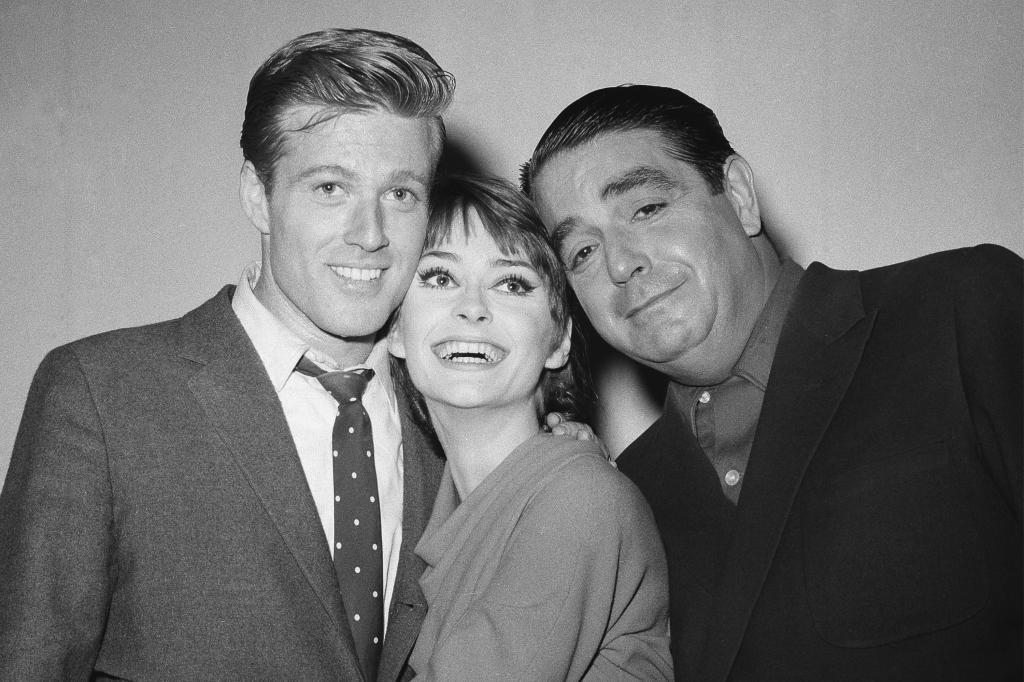Summing up the career of Robert Redford, the undisputed heartthrob of 60s and 70s Hollywood, in just a handful of titles seems like a daring task. His filmography, extensive and acclaimed, is too vast to cover completely. However, the actor who passed away at the age of 89 in his Utah residence, and who was ignored by the Academy for decades at the Oscars, deserves a look back at his acting life. Here are some of his best films.
Barefoot in the Park (1967)
Robert Redford had already starred in this Broadway story, but the big screen was still waiting to turn him into a star, into that actor with a dazzling lopsided smile and a symbol of beauty. The newlywed couple he forms with Jane Fonda is hilarious at times. He, a lawyer, upright and formal. She, unrestrained and vivacious. Until at one point Redford tells her, in the middle of an argument, "I'm not upset, Corie. I'm just trying to keep my sanity while you throw it out the window, brick by brick." And she is left speechless. Understandably so.
Butch Cassidy and the Sundance Kid (1969)
Before we get to The Sting, it was the western by George Roy Hill that definitively catapulted Robert Redford to fame and solidified the partnership with Paul Newman. Sundance Kid, the inseparable companion of Butch Cassidy, was the first joint venture of these actors on the big screen. They took on banks in Wyoming, the Union Pacific mail train, and captured the hearts of all women - and a few men - who came to see them. You may recall that iconic jump into the river to escape the police. It almost didn't happen because Redford wasn't a strong swimmer and wasn't sure if he could do it. But he did, and it became a moment etched in cinema history.
Jeremiah Johnson (1972)
To embody John Liver-Eating Johnson, the actor immersed himself in learning survival techniques, fishing, and hunting with mountain men. This film allowed Redford to express his environmental concerns, a political stance that would shape his life at a time when these issues were not as central as they are today. It also showcased that there was more to the actor than just his physical appearance. Silent, introspective, with minimal dialogue, his portrayal as the Mountain Man left a lasting impression.
The peak of the trio formed by Newman, Redford, and Roy Hill came in 1973 with The Sting. Once again, two con artists, Henry Gondorff (Newman) and Johnny Hooker (Redford). Their charisma as a duo turned the film into an absolute classic of 70s Hollywood. The absurd scene at the station where the plan is exposed had to be filmed several times while the two actors entertained each other with jokes during breaks. And the scene of Newman in the shower with Redford sitting on the toilet waiting to convince him to join is unforgettable. "I thought I'd find you in the back room counting money," Hooker says to a bewildered Gondorff. This was Redford's only Oscar nomination as an actor.
Three Days of the Condor (1975)
The thriller starring Robert Redford under the direction of Sydney Pollack - once again in their collaboration - paved a new path for the actor. No longer the confident and charismatic thief, Joe Turner is a mere CIA analyst who uncovers a conspiracy within the agency that forces him to flee as his colleagues are being murdered. Redford and Pollack had a close relationship, and the script also had the political component that interested the actor. The echoes of Watergate still resonated strongly among the American population, and the distrust in institutions was the perfect backdrop for this film.
Available on Movistar+ and Filmin
All the President's Men (1975)
In 1967, Robert Redford was not cast as the lead in The Graduate because he was considered too good-looking for the role. That part went to Dustin Hoffman. Eight years later, both actors would meet in All the President's Men as journalists Bob Woodward and Carl Bernstein, investigating the Watergate scandal - once again politics playing a role in the actor's career. It is said that during filming, Redford and Hoffman embodied two opposite acting styles. The former, relaxed and natural. The latter, pure intensity. The perfect complement to each other.
Robert Redford's presence can be epitomized by that scene, on the verge of trouble, where he washes Meryl Streep's hair with a jug. Never has so much sensuality been captured in a stream of river water. His Denys Finch Hatton is the epitome of a free man. He rides, soars over Africa in a plane, and converses amicably about the beauty of being a free man. "I don't want to own anything. I just want to live," Redford says at one point in what is considered one of the great gems of romantic cinema history.
While it may not resonate as one of the great films in Robert Redford's filmography, it is a more than enjoyable thriller. Above all, it marks the transition of power from a classic heartthrob to a modern one. Redford plays a cunning CIA agent on his last day of service, and Brad Pitt is his young protégé. One embodies calm and experience while the other represents the impulsiveness of youth even when his life is at stake. During the filming of this movie, Redford himself remarked that his co-star reminded him of his younger self. Who would dare to deny it.
